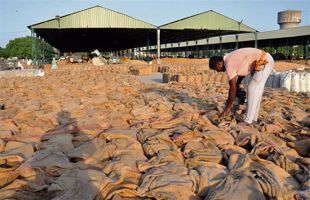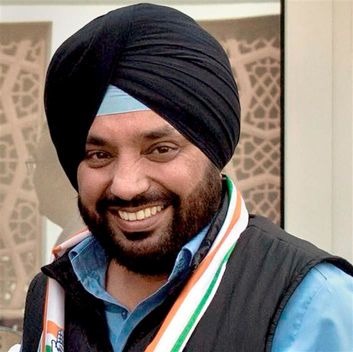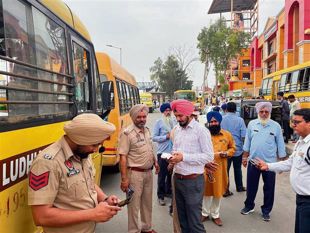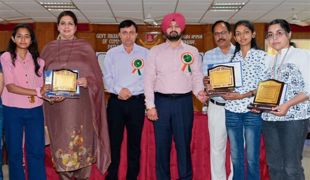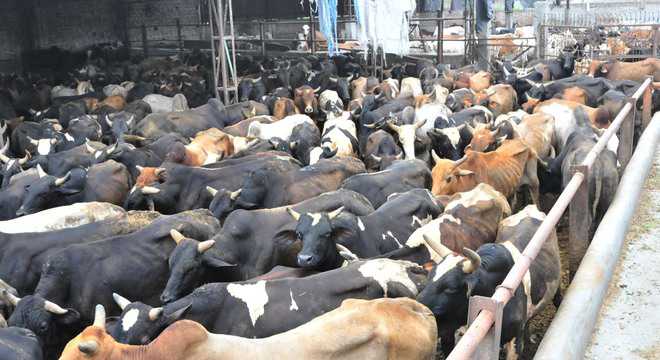
Stray cattle at a gaushala in Jalandhar. Against the capacity of 400, the gaushala has 600 cattle. Tribune Photo: Malkiat Singh
Ruchika M. Khanna
Tribune News Service
Ropar/Nawanshahr/Jalandhar
Road accidents attributed to sudden appearance of stray cattle have resulted in 285 deaths in Punjab in the last two years. That's just one aspect. The Punjab Gau Sewa Commission puts the number of stray bovines in the state at 1.06 lakh. The ruling Akalis are clueless about what to do with them, except honour coalition partner BJP’s one-point agenda of not to touch them.
The 472 privately-run gaushalas in Punjab are bursting at the seams with stray cattle and since cow slaughter is a cognisable offence in the state, road accidents caused by stray cattle are so common that they largely go unreported.
If these animals are let loose to die by their owners, their condition is no better in the gaushalas. Visits to gaushalas in Ropar, Nawanshahr and Jalandhar reveal that barely 10 per cent are milch animals. The rest are either too old or sick, or both.
In Jalandhar and Nawanshahr, the otherwise healthy animals caught by cow vigilante groups and sent to gaushalas, too, have been injured in bovine fights. Veterinarian Dr Parminder Singh, who works at the Gaushala Pinjara Pole, Jalandhar, says that against a capacity of 450 animals, they have 600. "There is little space for animals and they tend to fight and injure each other. The animals left here by a vigilante group, caught while being sold by one dairy farmer to another, are now injured and some can no longer produce milk," he points out.
Across the state, the grazing grounds, which still exist in revenue records, are under illegal occupation. The animals are confined in the gaushalas, and their restricted movement is leading to a high mortality rate.
The government, under pressure from cow protection groups, which have got political sanctity of late, has taken some baby steps to deal with stray cattle, but these seem to be misdirected. The government proposed to set up gaushalas in 22 districts of the state. Each district has been given a grant of Rs 1 crore to lease out land, construct sheds for animals and arrange water and power connections.
However, the district administrations in most cases have already spent two to three times the sanctioned money just to lease out land and raise the infrastructure. Punjab's declining fiscal health is no secret. There is no money left to start catching the stray cattle and keeping them in the gaushalas.
According to animal husbandry standards, each milch cow needs 35 to 40 kg (40x1= Rs 40) green fodder and 5 kg (5x4=Rs 20) wheat straw daily. The total feed cost comes to around Rs 60 everyday. Including other expenses (labour and water charges etc.; power supply to gaushalas is free), the cost per cattle comes to Rs 100. Thus, the daily expenditure per cattle will be Rs 48,180 and Rs 17.5 crore annually.
Officials in the district administration agree that while they do not see the funds forthcoming, they would have to rely on private donations. "But how can government officers put pressure on individuals to donate for gaushalas? The person who donates under pressure will definitely seek some favours," says a senior officer.
Though the government has levied cow cess on liquor, fuel and some other items, it is too less to meet the expenditure of running the gaushalas. BB Sharma, president of Gopal Gaushala, Ropar, says that under the law, the local bodies department (municipal body) can pay gaushalas for feeding stray animals that are caught by the local bodies. "But any organisation that runs gaushalas has lakhs of rupees pending as payments from municipal councils. Our own dues are to the tune of Rs 40 lakh. How do you expect the government to run gaushalas on their own?" he asks. Realising this, the government is mulling handing over the newly constructed gaushalas to NGOs, but no decision has been taken yet.
Punjab Gau Sewa Commission chairman Kimti Bhagat agrees that a long term solution to deal with the stray cattle menace needs to be worked out. "We will put all the 1.06 lakh stray animals in gaushalas. But what about the dairy farmers who continue to let off other animals? The need of the hour is to mark all dairy animals by tagging identification chips,” he says.





















